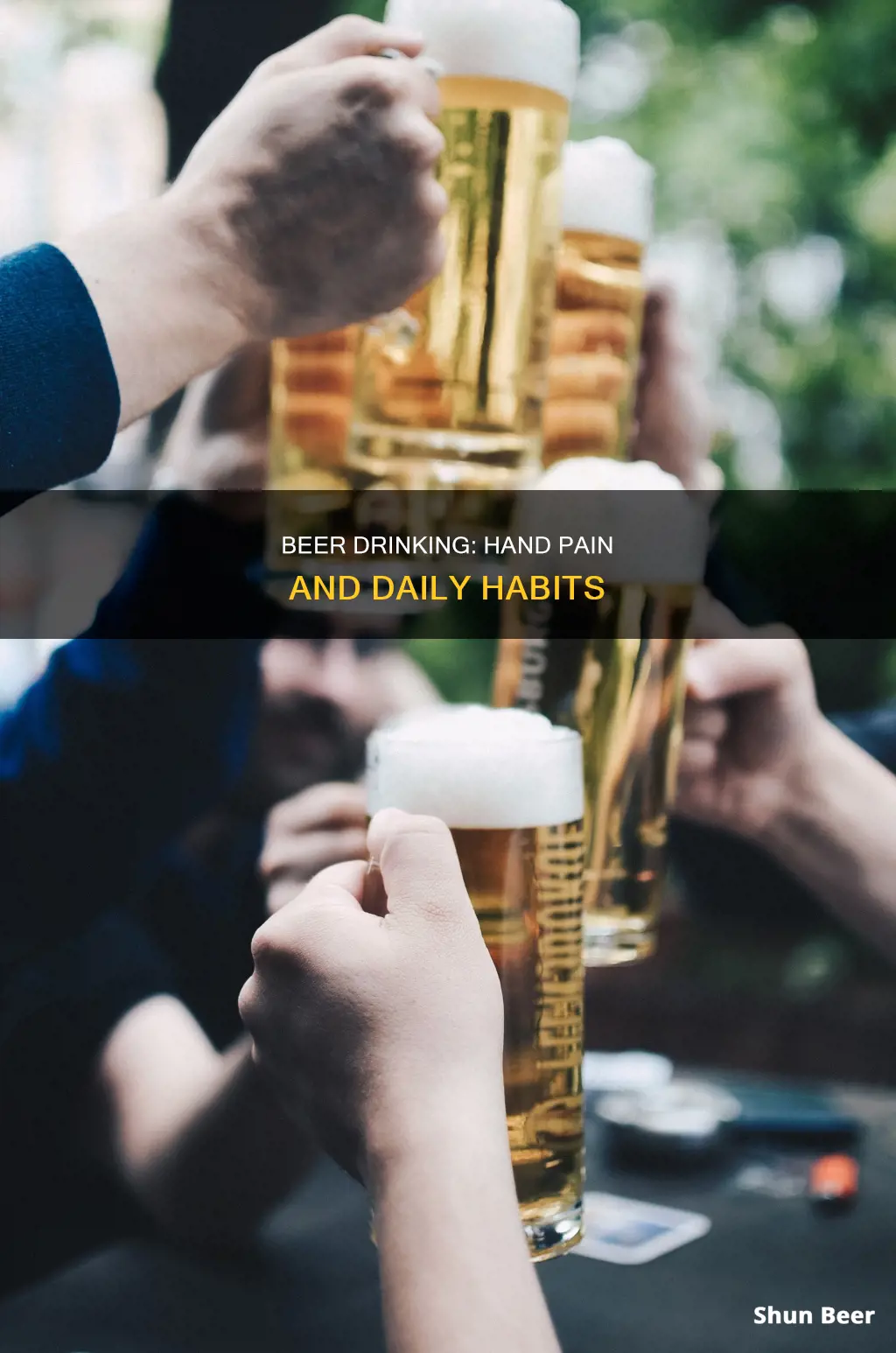
Drinking beer every day can have several adverse effects on the body, including joint pain, swelling of the hands, and nerve damage. Beer, like other alcoholic beverages, is a diuretic, which increases urine production and the risk of dehydration. This dehydration can lead to reduced lubrication in the joints, causing discomfort and exacerbating pain, especially in weight-bearing joints like the knees and hips. Additionally, alcohol can interfere with the absorption of essential nutrients such as vitamin D and calcium, which are vital for maintaining bone health.
Furthermore, excessive alcohol consumption can cause inflammation, which can be particularly problematic for individuals with pre-existing inflammatory joint diseases such as rheumatoid arthritis. Alcohol can also increase uric acid levels in the blood, leading to the formation of urate crystals in the joints, a key factor in gout, which results in severe pain and swelling.
In the long term, heavy drinking can lead to alcoholic neuropathy, a condition in which the nerves become damaged, resulting in pain, tingling, and numbness in the limbs. This nerve damage is caused by both nutritional deficiencies and the toxic buildup of alcohol in the body.
| Characteristics | Values |
|---|---|
| Alcoholic Neuropathy | A condition caused by nerve damage from heavy alcohol consumption over a long period of time |
| Symptoms | Burning pain in the body, hyperalgesia, allodynia, bruises, cuts, sores, decreased pain and sensation in the hands, lack of coordination, weakness in the hands, etc. |
| Dehydration | Alcohol is a diuretic, causing increased urine production and a higher risk of dehydration, which dries out the body's tissues and joints |
| Inflammation | Alcohol boosts the inflammatory response, which can worsen symptoms for those with inflammatory joint diseases such as rheumatoid arthritis |
| Uric Acid Levels | Alcohol increases uric acid levels in the blood, leading to the formation of urate crystals in the joints, which is a key factor in gout |
| Nutrient Absorption | Alcohol interferes with the absorption of essential nutrients like vitamin D and calcium, critical for bone health, leading to weakened bones and joints |
| Sleep Patterns | Alcohol disrupts sleep cycles by making it harder to achieve REM sleep, leading to fatigue and joint pain |

Alcoholic neuropathy
Drinking beer or any alcoholic drink every day can have several adverse effects on the body. One of the most common adverse effects of chronic alcohol consumption is alcoholic neuropathy, which is a condition in which the nerves become damaged due to years of heavy alcohol consumption.
Causes
Symptoms
The signs and symptoms of alcoholic neuropathy can progress gradually and are usually subtle at first. They can include any combination of the following:
- Bruises, cuts, sores, or skin infections on the toes, feet, or fingers
- Constipation or diarrhea
- Decreased pain from injuries, especially in the feet or hands
- Decreased sensation in the toes, feet, legs, fingers, hands, or arms
- Dizziness, particularly when standing with eyes closed
- Lack of coordination of the feet or hands
- Loss of balance/unsteadiness when walking
- Pain, tingling, or other unusual feelings in the toes, feet, legs, fingers, hands, or arms
- Trouble walking a straight line, even without recent alcohol use
- Urinary incontinence
- Weakness in the feet or hands
- Muscle spasms and cramps
- Muscle weakness and wasting
- Loss of balance or coordination
- Problems starting urination
- Feeling that the bladder hasn’t been emptied fully
- Fast heartbeat (tachycardia)
- Dizziness or lightheadedness
- Erection problems (impotence)
- Problems swallowing or talking
- Unsteady gait (walking)
Diagnosis
The diagnosis of alcoholic neuropathy involves a combination of medical history, physical examination, and possibly blood tests or nerve tests such as electromyography (EMG) and nerve conduction studies (NCS).
Treatment
The most important first step in treating alcoholic neuropathy is stopping alcohol consumption. Treatment for alcoholism may include counseling, social support such as Alcoholics Anonymous (AA), or medications. It is also important to supplement the diet with vitamins, including thiamine, folic acid, and vitamin B12. Physical therapy and orthopedic appliances (such as splints) may be needed to maintain muscle function and limb position.
Beer and Wisdom Teeth: Safe Drinking Timeline?
You may want to see also

Dehydration
Drinking beer every day can lead to dehydration, which can cause hand pain. Dehydration occurs when the body loses more fluids than it takes in, and it can have several negative effects on the body. Here are some key points about dehydration:
Impact on Joint Health
Causes of Dehydration
Several factors can lead to dehydration. One of the main causes is consuming diuretic substances, such as alcohol. Diuretics increase urine production, causing the body to lose fluids more rapidly. In addition to alcohol, certain medications, such as diuretics (water pills), can also contribute to dehydration by increasing urination. Other causes of dehydration include excessive sweating, fever, diarrhea, and vomiting.
Symptoms of Dehydration
It is important to recognize the signs and symptoms of dehydration to address it promptly. Some common symptoms include thirst, dry mouth, headache, fatigue, dizziness, muscle cramps, and dark-colored urine. Dehydration can also cause confusion, delirium, high heart rate, low blood pressure, and heat intolerance. In severe cases, dehydration can lead to life-threatening complications such as heatstroke, kidney failure, and shock.
Preventing and Treating Dehydration
To prevent dehydration, it is essential to maintain proper hydration by drinking fluids throughout the day, especially water. It is recommended to drink before you feel thirsty because thirst is a sign of mild dehydration. During physical activities or time spent in hot weather, it is crucial to increase fluid intake to compensate for fluid loss through sweating.
In addition to hydration, eating a healthy diet rich in anti-inflammatory foods and regular exercise can help support joint health. Physical activities such as yoga or swimming can boost joint flexibility and strength. However, if joint pain persists or worsens, it is advisable to consult a healthcare professional for personalized advice and treatment options.
Hot Beer: Safe to Drink or Not?
You may want to see also

Inflammation
Drinking beer every day can lead to inflammation, which in turn can cause hand pain. Inflammation is the body's immune response to an irritant or foreign substance. When inflammation occurs, inflammatory mediators are released into the blood and transported to the affected area in an attempt to heal.
Alcohol is inflammatory when consumed in excess. It boosts the body's inflammatory response, and this excessive inflammation can lead to severe joint and hand pain, especially for those already suffering from inflammatory joint diseases such as rheumatoid arthritis. Alcohol can alter immune function, exacerbating these inflammations and worsening symptoms.
Alcohol consumption can trigger inflammation or worsen existing inflammation. It is essential to reevaluate lifestyle choices to reduce the chances of inflammation and painful joint damage. Reducing alcohol consumption while continuing to consume inflammatory foods and maintaining a sedentary lifestyle will not produce the desired results. Instead, developing a healthy lifestyle that enables one to enjoy life to the fullest is recommended.
In addition to its inflammatory effects, alcohol can also cause dehydration, which further contributes to hand pain. As a diuretic, alcohol increases urine production and the risk of dehydration, drying out the body's tissues and reducing lubrication in the joints. This lack of lubrication increases friction between the joints, leading to discomfort and exacerbated pain.
Celiac Disease and Beer: What's the Danger?
You may want to see also

Uric acid levels
Drinking beer every day can cause hand pain through several mechanisms, one of which is by increasing uric acid levels in the blood. Uric acid is a byproduct of purines, which are chemical compounds found in certain foods, like red meat and seafood, as well as in alcoholic beverages, especially beer and spirits.
Beer is rich in purines, and consuming it causes the body to produce uric acid. Overproduction of uric acid can lead to hyperuricemia, a condition of excess uric acid in the blood. Hyperuricemia increases the risk of gout, an inflammatory form of arthritis. Excess uric acid within the blood can crystallize and form deposits within the joints, which triggers an inflammatory response that may lead to joint pain, swelling, and issues with mobility. Gout most commonly affects the feet and toes, but it can also impact other joints.
A 2021 review found that most studies linked gout to the consumption of alcoholic beverages, especially beer and spirits. The researchers recommended that people with gout, as well as those at risk of developing the disease, limit their alcohol consumption to prevent gout episodes or flares.
In addition to increasing uric acid levels, alcohol affects the body in other ways that can contribute to joint pain, including dehydration and boosting the inflammatory response. Therefore, reducing alcohol intake is one of the most effective ways to alleviate joint pain.
Beer and Afib: What You Need to Know
You may want to see also

Nutrient absorption
Drinking beer every day can cause joint pain, including in the hands, due to its impact on nutrient absorption. Alcohol interferes with the body's ability to absorb essential nutrients that are critical for maintaining healthy joints and bones. This can lead to weakened joints and bones, increasing the risk of pain and injuries.
Alcohol can affect the absorption of several key nutrients, including:
- Vitamin D: Vitamin D is important for bone health, and a deficiency can lead to weakened bones and an increased risk of fractures.
- Calcium: Similar to vitamin D, calcium is vital for bone health, and insufficient calcium intake can contribute to bone loss and increase the risk of joint pain.
- Vitamin B1 (Thiamine): Chronic alcohol consumption can impact the absorption of vitamin B1, which is important for nerve health. Thiamine deficiency can lead to nerve damage and pain.
- Magnesium: Alcohol decreases the absorption of magnesium, which is essential for muscle and nerve function. Magnesium deficiency can cause muscle weakness, cramps, and pain.
- Selenium: Alcohol can interfere with the absorption of selenium, a mineral that acts as an antioxidant and helps reduce inflammation in the body.
- Vitamin B2: Alcohol can hinder the absorption of vitamin B2, which is important for energy production and maintaining healthy skin and eyes.
To mitigate the impact of alcohol on nutrient absorption, it is crucial to ensure adequate intake of these nutrients through a balanced diet or supplements. However, the most effective way to prevent joint pain and other health issues related to alcohol consumption is to reduce the amount of alcohol consumed or abstain from drinking altogether.
Beer-Only Diets: A Dangerous, Unhealthy Way to Survive
You may want to see also
Frequently asked questions
Drinking beer or any alcoholic drink every day can lead to alcoholic neuropathy, a condition in which the nerves become damaged as a result of years of heavy alcohol consumption. Symptoms include pain, tingling, and numbness in the hands.
Drinking beer every day can cause inflammation, which can lead to joint pain, especially for those already suffering from inflammatory joint diseases such as rheumatoid arthritis. It can also cause dehydration, which can lead to body pains, including hand pain.
If you experience hand pain after drinking beer every day, it is important to consult with a healthcare professional. They can offer advice and treatment options specific to your health needs and help you understand how to manage your symptoms effectively.







